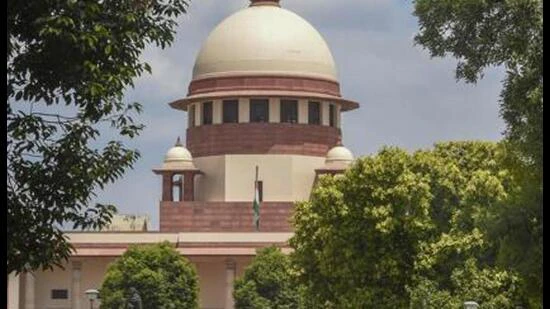Political parties opposing the Waqf Amendment Act have called Centre’s attempt to draw an “artificial” distinction between Waqf properties and Hindu endowments on the ground that Waqf is a broad concept encompassing non-religious charitable purposes, including healthcare and education, “unsustainable”.
The Dravida Munnetra Kazhagam (DMK) and the Indian Union Muslim League, in separate responses filed on Sunday, told the Supreme Court that even state enactments governing Hindu endowments encompass charitable purposes including schools, orphanages and healthcare.
The Centre, in its affidavit filed in response to the petitions and applications challenging the validity of the 2025 Act, submitted that the law seeks to address only the secular aspects of Waqf management, to justify the inclusion of non-Muslims in the Central Waqf Council and Waqf Boards.
The DMK, in its response, settled through senior advocate P Wilson, said, “The distinction sought to be drawn by the respondent between waqfs and Hindu endowments on the ground of charitable breadth is demonstrably artificial and unsustainable.”
Further, the DMK said that the Centre’s argument that Waqf differs from Hindu endowments because Waqf encompasses charitable purposes such as healthcare, education, and aid to the poor and needy, is entirely “fallacious”.
Earlier in April, the DMK approached the top court, saying that the Act violates the fundamental rights of nearly five million Muslims in Tamil Nadu and 200 million Muslims across India.
The DMK also contradicted the Centre’s assertion, citing the examples of Telangana Charitable and Hindu Religious Institutions and Endowments Act, 1987; Himachal Pradesh Hindu Public Religious Institutions and Charitable Endowments Act, 1984; Karnataka Hindu Religious Institutions and Charitable Endowments Act, 1987; Tamil Nadu Hindu Religious and Charitable Endowments Act, 1997; and Madras Hindu Religious and Charitable Endowments Act, 1951, and said that these define “charitable purpose” to include non-religious institutions such as rest houses, schools, colleges, hospitals, which are secular in utility.
The DMK also questioned the inclusion of non-Muslims in the Waqf Board or Council. “The issue is not who benefits, but who administers – and the settled principle is that institutions grounded in religious law and religious objectives must be governed by adherents of that religion, in keeping with the rights guaranteed under Article 26 of the Constitution,” DMK said in its rejoinder filed through advocate Anuradha Arputham.
To be sure, the Supreme Court earlier questioned the Centre whether Muslims will be permitted to be members of Hindu endowments, as the Centre justified including a maximum of four non-Muslims in the 22-member Central Waqf Council and a maximum of three in the 11-member Boards.
The IUML affidavit echoed the same sentiment by saying, “The respondent’s (Centre) artificial distinction between secular and religious aspects masks the Act’s intrusive impact on Muslim religious rights.”
The IUML response, prepared by advocates Haris Beeran and Usman Ghani Khan, further asserted that Centre’s portrayal of “waqf by user” being a “safe haven for encroachment” is factually incorrect, and alleged that the assertion in Centre’s affidavit that registration has been mandatory since 1923 is false, since the Waqf Act 1995 (that stood amended by the 2025 Act), protected unregistered “Waqf by User” under Section 3(r)(i), a safeguard now removed.
“These assertions risk fueling a narrative that unjustly vilifies Waqf Boards, endangering communal harmony,” IUML said, adding, “The rushed passage of the Act (in the Parliament) on April 3- 4, 2025, suggests political motivations over genuine reform, as alleged by opposition leaders.”
The DMK’s affidavit mirrored this view as it said, “The timing and manner in which the impugned legislative exercise was undertaken reflect a conscious and deliberate departure from the foundational principles of legislative transparency, democratic deliberation, and procedural fairness… In such circumstances, any reliance by the respondents on claims of detailed deliberations, consultative processes, or Joint Parliamentary Committee (JPC) reports is wholly misplaced and untenable.”
It even questioned the newly introduced Section 36(1A), which effectively bars the creation of waqfs by user or orally, claiming it to be discriminatory and violative of Articles 14 (right to equality) and 25 (right to practice religion) of the Constitution. “While it is well-settled that Hindu religious trusts can be created without a written instrument, the Amendment Act creates an unequal and unjustifiable bar specifically against Muslims,” the DMK response said.
A bench headed by Chief Justice of India (CJI) Sanjiv Khanna and comprising justices Sanjay Kumar and KV Viswanathan will take up the petitions along with the responses filed by the Centre, petitioners and other parties on Monday.
